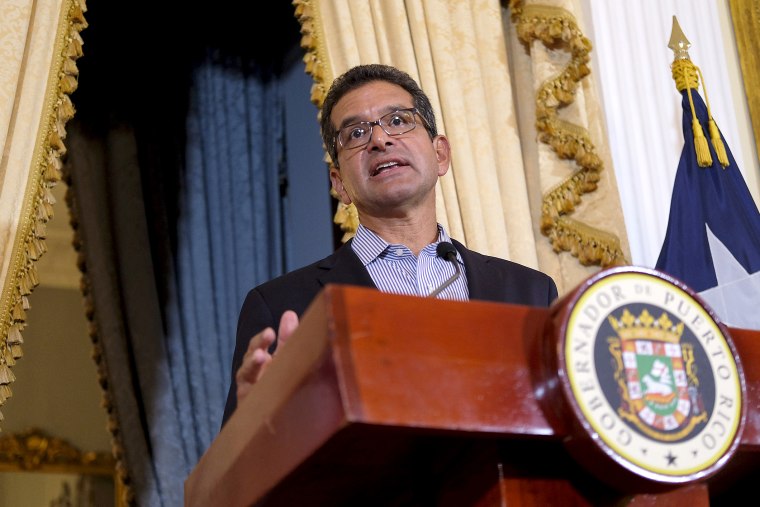Puerto Rico’s governor announced Tuesday that a federal control board reached a key deal that would reduce the U.S. territory’s overall debt by nearly 80 percent, but that his administration is rejecting it because it would require cuts to the island’s crumbling public pension system.
The impasse between the governor and a board that oversees Puerto Rico’s finances threatens to throw into limbo attempts to end a bankruptcy-like process for a government that six years ago declared unpayable its more than $70 billion public debt load.
The deal was reached with creditors who hold general obligation bonds and Public Building Authority bonds sold by Puerto Rico’s government and would resolve $35 billion worth of debt and non-debt claims, according to the board. It also would reduce debt held by those creditors from $18.8 billion to $7.4 billion, a 61 percent reduction, and would provide them with $7.4 billion in bonds and $7 billion in cash, among other things.
The board said the deal would free up more than $300 million a year for government services, and that instead of 30 cents for every dollar in taxes and fees that Puerto Rico’s government collects going to creditors, it would be less than 8 cents.
“I firmly believe this is the best outcome we could achieve in today’s economic uncertainty, not only for the people of Puerto Rico but also for creditors who have an interest in Puerto Rico’s long-term viability and creditworthiness,” said board chairman David Skeel.
Gov. Pedro Pierluisi, however, disagrees.
He said in a statement that while the agreement is positive in many ways for Puerto Rico, his administration does not back the deal that is scheduled to be submitted in court next month and requires final approval from a federal judge overseeing the bankruptcy-like process.
“The plan of adjustment should not be structured in a way that affects our pensioners even more,” he said.
Pierluisi added that finalizing the restructuring of a portion of Puerto Rico’s debt is a priority for his administration, but not at the expense of retirees: “Putting the bankruptcy process behind us is a fundamental step toward the recovery and economic development of our island.”
Puerto Rico accumulated the debt after decades of mismanagement, corruption and excessive borrowing to balance budgets. A former governor declared it unpayable in 2015 and then two years later, the government filed for the biggest U.S. municipal bankruptcy in history.
Officials are now restructuring a portion of that debt amid a nearly 15-year economic crisis that deepened after Hurricane Maria, a string of strong earthquakes that hit a year ago and the ongoing pandemic.
The creditor groups involved in the deal hold more than $11 billion worth of bonds. Those who hold more than $8 billion of those bonds said they have engaged in good faith with the board to provide Puerto Rico with the financial flexibility it needs to recover from the pandemic.
“This widely-supported compromise will help Puerto Rico avert years of costly, distracting litigation and finally expedite the island’s long-awaited exit from bankruptcy in 2021,” they said in a statement.
The board said mediation continues with creditors that hold other types of bonds, including Employee Retirement System ones.
Follow NBC Latino on Facebook, Twitter and Instagram.

